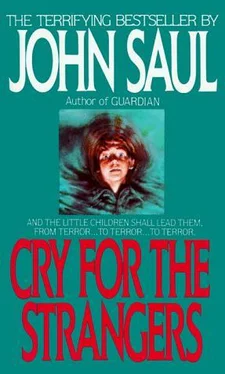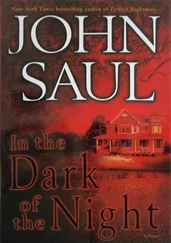Hearing his words from the living room, Elaine hurried in to find out what had gone wrong.
“Glen? Is something wrong?” She looked first at Glen, then at the children, and she too knew immediately. She knelt down and gathered the children into her arms. They clung to her, almost tentatively, then Missy, followed by Robby, broke into tears and buried their faces against her. As she held the children she looked up into Glen Palmer’s drained face.
“I’m sorry,” she said. “I’m so sorry …”
Glen swallowed and forced himself to stay coherent. “Can you … can you …?” He couldn’t finish the sentence, but Elaine understood.
“I’ll take care of them. Brad, go with him. Help him.”
Brad had been silently standing by but he suddenly came to life, grabbing for his coat. A moment later the two men disappeared into the night.
Elaine steered the children into the living room and settled them on the sofa. Then, before she did anything else, she quickly went through the house, checking all the windows, making sure they were closed and locked. Finally she bolted the doors, rattling each to be sure it was secure.
When she returned to the living room Missy was staring into the fire, lost in some small world of her own devising. But as Elaine sank down beside her the little girl took one of her hands, squeezed it, and smiled up at her.
“It’s going to be all right,” she said. “Really it is.”
For some reason that Elaine never understood, Missy’s words made her cry.
Glen and Brad carried Rebecca into the cabin and laid her on the floor. While Glen poked at the dying fire, wishing he could bring life back to Rebecca as easily as he could the coals, Brad began a quick examination.
It didn’t take him long. By the time the fire was blazing he had finished.
“She was strangled,” he said. “And her neck’s broken.”
“Oh, God,” Glen said, shuddering. “It must have been terrible for her.”
“That’s something we don’t know,” Brad replied quietly. “I like to think the body has ways of dealing with things like this. We know we go into shock immediately when something happens to us suddenly and unexpectedly. I should think it would be the same with dying. Some automatic mechanism takes over and makes us comfortable. Anyway, that’s the way it should be. But we’ll never know, will we?”
“How long has she been dead?” Glen asked.
“Not long. An hour. Maybe two at the most.”
“If only I hadn’t stayed so long,” Glen said. “If only I’d left a little earlier. Just a few minutes maybe—”
“Don’t,” Brad said. “Don’t start that or you’ll wind up blaming yourself for what happened. And you aren’t to blame.”
“I brought her here,” Glen said.
“And it could as easily have been you out there tonight,” Brad said roughly. “Now come on. We’d better get into town.”
Glen looked around the little room.
“I hate to leave her here, all alone …”
“No. You’re coming with me. I’m not leaving you with her. Not tonight, not here. Put on your coat.”
They were about to leave when they suddenly heard a sound from the children’s room.
A small sound, barely a whimper.
Then, as they were about to investigate, Scooter, his small tail tucked between his legs, crept out into the living room.
He stopped, peered vacantly up at the two of them; then his tail began to wag and he stumbled clumsily toward Glen. Glen stooped, picked the puppy up, and scratched its belly. By the time they were in the car Scooter was fast asleep.
Chip Connor was alone in the police station when Brad and Glen arrived.
“It’s Rebecca,” Brad said.
The muscles in Chip’s face tightened and he sank back into the chair behind Harney Whalen’s desk.
“Is she dead?”
“Yes.”
“Where?”
“On the beach.”
“Shit.” Then: “I’ll have to call Harn.”
“I know,” said Brad. “But before you do I should tell you that I’m not going to let Glen talk to him tonight. As a doctor I’m putting him under my care.”
“Of course,” Chip said. “I don’t think anyone would expect anything else.”
“Don’t you?” Brad said mildly, almost tiredly. “I wish I could share your thought.”
If Chip even heard what Brad said he gave no sign. Instead he called Harney Whalen and quickly reported what had happened.
“I’ll meet you out at the Palmers’,” he said as he finished. Then he hung up the phone and looked at Glen, who had not yet spoken.
“Glen, can I ask you something, as a friend?”
“Sure,” Glen said dully.
“Did you do it?”
Brad was about make an angry reply but Glen put a hand on his arm, stopping him.
“No, Chip, I didn’t.” The two men stared into each other’s eyes, and finally Chip stood up and came around the desk.
“Try to take it easy, Glen. I’ll find him for you, so help me.” Then he turned to Brad.
“Can you give him a pill? To make him sleep?”
Brad frowned slightly. “I’m not sure he needs one.”
“Well, if it won’t hurt him give him one, will you?” There was a pause, then Chip shook his head sadly. “You were right about what you said before. Harney does want to talk to him.”
“I’ve just changed my mind,” Brad said. “What this man needs more than anything else is a good night’s sleep.”
But it wasn’t a good night’s sleep. Before dawn Glen Palmer woke up and reached for Rebecca.
She wasn’t there. She would never be there again.
Quietly, Glen Palmer began to cry.
There was a quality in the air the following morning, a numbing chill that lay over Clark’s Harbor like an invisible fog, shrouding the town.
The people of the village went about their business, tending their shops and boats, greeting each other as they always had. When they spoke of Rebecca Palmer, and of Jeff Horton, it was not with the worried clucking of tongues and expressions of concern that might have been expected, but rather with the knowing looks, the almost lewdly arched eyebrows of people who have finally witnessed that which they had known would come to pass.
When Glen Palmer arrived at the police station in midmorning, he was not stared at, not subjected to the hostile glares he had been expecting. Nor were there any expressions of sympathy at the loss of his wife. Rather — and to Glen even more frightening — it was as if nothing had changed, as if what had happened to him was not a part of Clark’s Harbor at all, not an event that touched the lives of the Harborites.
Only when he was inside the police station, inside Harney Whalen’s office, did reality intrude on the sense of surrealism that surrounded him.
Harney Whalen sat impassively at his desk, staring at Glen.
“Are you ready to talk about it now?” The words were more a challenge than a question. Glen braced himself. He knew what was coming.
In the old house on Sod Beach Elaine Randall did her best to keep Missy and Robby occupied, to keep them from dwelling on the loss of their mother. After Glen left the house, insisting on going alone to see Whalen, the children had wanted to go out on the beach.
Elaine had refused, not so much out of fear that anything would happen to them, but out of her own inability to face the beach that day.
She was not sure she would ever again be able to enjoy the beauty of the crescent of sand. For her it was permanently soiled.
Around noon she set the children to work on a jig-saw puzzle, then went to the kitchen to fix lunch.
“Keep an eye on them, will you, honey?” she asked Brad as she passed through the dining room. Brad glanced up from the charts he was poring over.
Читать дальше












